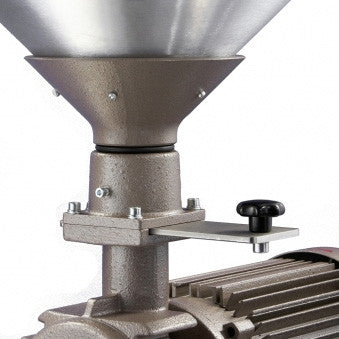Find the Best Industrial Coffee Grinder for Professional Use
Find the Best Industrial Coffee Grinder for Professional Use
Blog Article
Industrial Coffee Mill Overview: Increase Efficiency and Quality
In the competitive landscape of coffee manufacturing, selecting the right commercial coffee mill plays a critical function in enhancing both efficiency and product quality. Understanding the nuances of various mill kinds and essential attributes-- such as customizable work setups and durable construction-- can significantly influence the final flavor account of the coffee. The optimization of the grinding process, combined with diligent maintenance, is vital for maintaining performance over time. As we check out these essential aspects, it becomes noticeable that the implications extend beyond plain devices choice, influencing total service success in means that require closer exam.
Recognizing Mill Kinds
When selecting a commercial coffee mill, understanding the different kinds offered is vital for maximizing both taste extraction and functional effectiveness. The two key sorts of grinders are blade mills and burr grinders. Blade mills utilize sharp blades that chop coffee beans into irregular dimensions, causing irregular extraction and potentially unfavorable flavors. While blade mills are frequently a lot more budget friendly and ideal for small procedures, they are typically not recommended for industrial usage.

Eventually, selecting the ideal kind of mill is essential to maintaining top quality and performance in coffee manufacturing, making it imperative for businesses to buy premium burr grinders for ideal results.
Trick Features to Take Into Consideration
Choosing a commercial coffee mill calls for careful factor to consider of several essential attributes that can dramatically affect both efficiency and the overall coffee experience. Among the primary elements to review is the grinding mechanism. Burr grinders are usually favored over blade mills, as they provide a consistent grind size, which is vital for optimum extraction and taste.
Another vital attribute is the grinder's capability. Depending upon the quantity of coffee you require to procedure, pick a model that can handle your requirements without sacrificing speed or quality. Additionally, take into consideration the work settings used. A versatile mill with numerous setups enables you to customize the work size to various developing techniques, improving the coffee's taste profile.
The building material additionally contributes in durability and upkeep. Stainless steel elements typically supply durability and are simpler to cleanse, which is crucial for maintaining hygiene requirements. Finally, evaluate the grinder's noise degree, particularly in a hectic café or manufacturing atmosphere, where extreme sound can be disruptive. Buying a mill that stabilizes these functions can substantially enhance both functional effectiveness and the top quality of the coffee offered.
Optimizing Grinding Process
To achieve the ideal results in coffee preparation, maximizing the grinding process is necessary. The work dimension substantially influences removal, flavor, and general top quality of the brewed coffee. Various brewing methods require specific grind sizes; for circumstances, espresso requires a great work, while French press requires a crude appearance. Recognizing the partnership between grind dimension and developing technique is the initial step in optimization.


Furthermore, monitoring the grinding rate can maximize the procedure. Slower grinding usually produces less warm, protecting fragile tastes and scents. Alternatively, faster grinding might create excessive heat, negatively impacting the coffee's quality.
Upkeep and Care Tips
Correct maintenance and care of industrial coffee grinders are important for ensuring optimum performance and long life. Routine cleansing is the structure of upkeep; deposit accumulation can affect taste and grinding efficiency. It is recommended to clean the grinder after each use, wiping down the find this outside and eliminating any coffee premises from the burrs.
Furthermore, evaluate the grinding burrs for deterioration. Plain burrs can endanger grind consistency, so they must be replaced as necessary. Industrial Coffee Grinder. Regularly adjusting the mill is likewise essential, as this maintains the desired grind size for different developing approaches
Lubrication of relocating parts ought to be performed according to the manufacturer's requirements, as this decreases friction and extends the life of the devices. It is important to use food-grade lubricants to ensure safety and compliance with health policies.
Last but not least, maintain the mill in a stable and completely dry setting to avoid corrosion and deterioration. By adhering to these upkeep and care tips, operators can boost the performance of their commercial coffee mills while making sure top notch result and prolonged functional life.
Return on Investment Analysis
Evaluating the return on investment (ROI) for industrial coffee grinders is important for organizations looking for to maximize their coffee production capacities. An extensive ROI analysis aids establish the monetary stability of buying top quality grinders, permitting services to weigh the initial expenses versus potential gains.
Evaluate the acquisition cost of the mill, including installation and any kind of required alterations to existing framework. High-performance grinders frequently lead to minimized grinding time and raised throughput, which can significantly improve productivity.
Additionally, think about the effect on product high quality. Industrial Coffee Grinder. Superior grinders produce a more consistent grind size, which can boost taste accounts and consumer satisfaction, ultimately driving sales. By enhancing the quality of the final product, businesses can warrant greater rates, leading to increased revenue
Conclusion
In summary, a commercial coffee mill plays a crucial duty in boosting both performance and item high quality within coffee production. Ultimately, the strategic investment in a reliable mill contributes considerably to improved revenue and competition in the coffee sector.
In the affordable landscape of coffee production, selecting the appropriate commercial coffee grinder plays a critical role in boosting both performance and product quality. The 2 key types of grinders are blade mills and burr grinders. Within the burr mill classification, there are level burr mills and conical burr mills, each with its advantages. Burr grinders are usually favored over blade grinders, as they provide a regular grind dimension, which is critical for ideal extraction and taste.
In summary, a commercial coffee grinder plays a pivotal duty in improving both efficiency and item quality home within coffee company website manufacturing.
Report this page